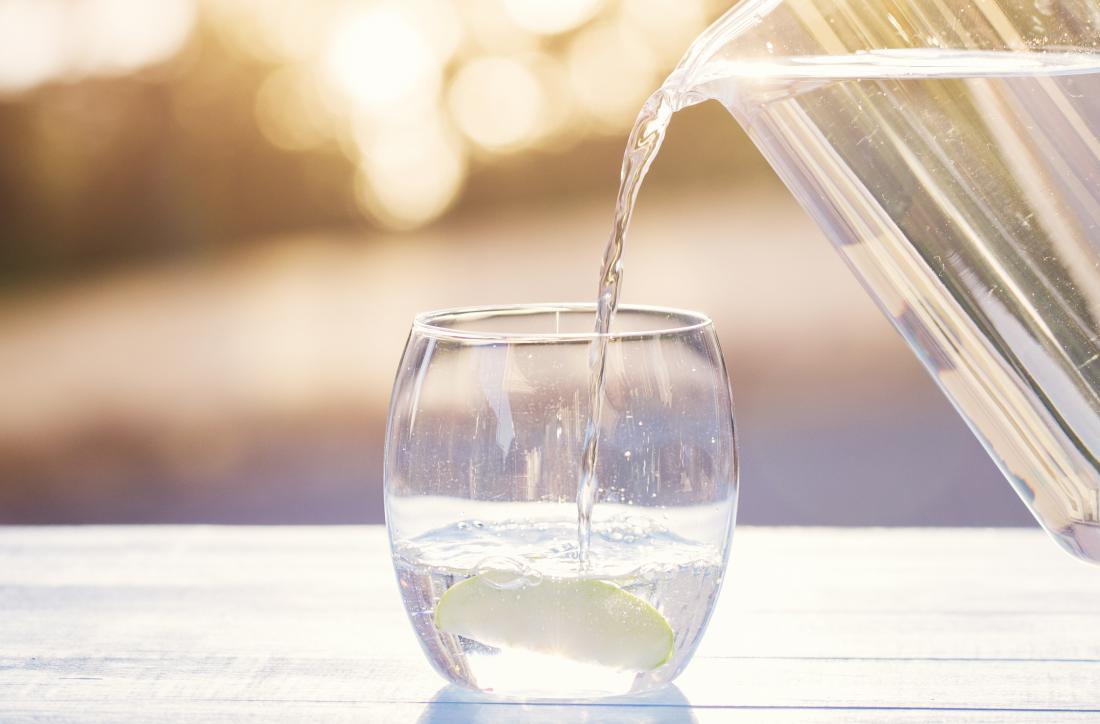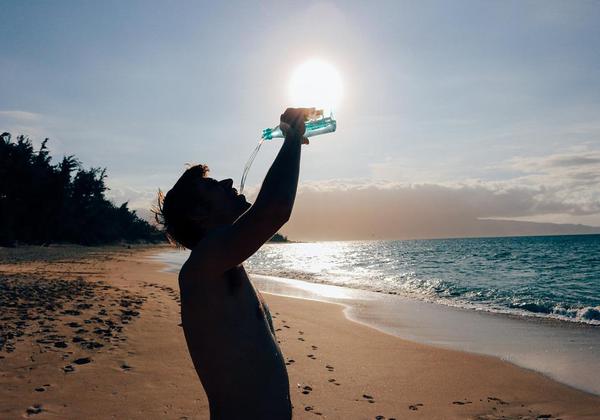
Green tea has long been touted as a 'weight-loss aid', a health drink for people struggling to lose weight. Experts vouch for two to three cups of green tea combined with a healthy diet plan in order to lose weight. Known for boosting metabolism and easing the process of digestion, it has been an amazing drink for many. However, as they say, anything in excess is bad, no matter how healthy a food it is. Does this wonder drink have any side effects? Can it cause any reverse effects in the body? How much green tea is enough to suit the daily requirement? Let's find out.According to Bangalore-based Nutritionist Dr. Anju Sood, "excess of green tea can dehydrate your body. Hence I wouldn't recommend more than three cups a day." Delhi-based Nutritionist Lokendra Tomar agrees, "Drinking excess amount of green tea increases acid in stomach due to high caffeine content. So drinking more than three cups of green tea can cause acidity, bloating, or acid reflux. Consuming excess green tea can also cause mineral deficiency, as it contains tannin that binds minerals like iron and further hinders its absorption in the body."
Here are some side effects of green tea -
1. Caffeine Overdose
Like any other tea, green tea consists of caffeine and excessive intake of caffeine can lead to health problems that include headache, sleeping disorders, irritability, anxiety and heartburn among others. Therefore, it is imperative to take not more than two or three cups a day.
2. Can Upset Stomach
Drinking green tea on an empty stomach can cause an upset stomach. Green tea has polyphenols known as tannins that increase stomach acid, which further leads to stomachache, nauseous feeling, burning sensation or even constipation. You must drink green tea in between meals or after a meal.
3. Reduces the Iron Content in the Body
Green tea has catechins that are known to boost metabolism and help reduce weight; however, its excessive consumption can cause reduced iron absorption in the body. It can be worse for those who already have an iron deficiency. You can reduce this effect by squeezing some lemon into the tea.
4. Causes Dehydration
Green tea is a natural diuretic, which causes the body to lose water, therefore drinking excessive green tea can cause excessive urination leading to dehydration and electrolyte imbalances. Dehydration further can cause problems like headaches, lethargy and fatigue.
5. Can Affect Those on Medications
While it is safe for healthy people to have at least two-three cups of green tea daily, it may not be deemed as safe for those on medications. Combining green tea with antibiotics, stimulants, asthma medications or any other drug can pose a risk of liver damage. It is recommended to refer to a doctor before turning to green tea during medications.
Green tea sure is a great aid to help you lose weight; however, moderation is the key here. In case of any doubts and confusions, it is always good to refer to a doctor and then take the recommended dose of green tea to avoid health problems in the long run.
Everyone has heard the advice 'drink eight-ounce glasses of water a day', which is popularly known as 8 by 8 rule. Another popular advice is 'drink 4 glasses of water empty stomach', aka Usha Paana Chikitsa, a term used widely in Ayurveda.
People advocate intake of water on an empty stomach, describing how it cleanses the body and cures a wide range of diseases starting from allergies to cancer. Messages regarding its benefits are forwarded in WhatsApp groups and on Facebook as if it’s the elixir of life as described in the world-renowned book 'The Alchemist'.
Usha Paana in Ayurveda
Originally described in Rasayan Adhyaay of Ashtang Hruday, it has been stated that a person who drinks Sheetodak i.e cold water early morning will continue to remain young. Many people start following this process
blindly without understanding the fine details involved.
-First of all, this has been described as a rasayan and hence, it should be only followed by a person who has underwent detoxification through Panchkarma. Even if detoxification is not possible for everyone in today's era atleast the concerned person should be devoid of any illness.
-Secondly, according to Ayurveda, a person should get up at Brahma Muhurat i.e around 5.30 am. So even if without detoxification a person has to practice Usha Paan as a routine then he should consume it at around 5.30 am in the morning after passing stool because that’s the first thing that has been advised after getting up.
Half the people who practice Usha Paan Chikitsa, drink water to help them get relieved of constipation, which is actually bad for their health. It is as if they try to push the stool out from their body by drinking excess water.
Relation of water intake and meals:
'Sam Sthula Krusha Bhukta Madhya Antah Prathama Ambu Pah'
A simple sutra mentioned in DravDravyadi Vidyaaneya Adhyay describing effects of water intake while having food, after intake of food and before intake of food.
1. It is clearly stated that a person who drinks water while consuming food continues to remain in same state of health i.e swastha (Healthy).
2. If a person wants to gain weight, then he should drink water just after consuming his meal. (Max 160ml)
3. If a person wants to lose weight, then he should drink water just before consuming his meal.
Here drinking water just before meals will make the person get a feeling of fullness and hence, automatically his food intake will decrease. Of course, he has to stop eating as soon as his hunger is satiated. He should not eat food just because he eats that much quantity everyday.
To know the quantity of appetite a person should have just consider to divide your hunger/appetite in four parts. Consume food, which will fill two parts. Have one part water and keep the remaining one part of your appetite empty.
Another advice we get from many people, especially from Naturopathy is to not have any water during meals Have a jug (450 ml and above) full of water after 40 Mins of consumption of food.
Firstly this advice has nothing to do with Ayurved. Naturopathy and Ayurved are not even closely related.
Ayurveda practitoners follow the sutra given below :
-Ajirne Bheshajam Waari Jirne Waari BalPradam
-Bhojane Cha Amrutam Waari Bhojanaante VishPradam
1. If a person suffers from indigestion then he should consume Ushnodak Jal (warm water) as medicine.
2. Water consumed after the food is digested (Minimum 6 hrs after meal) will increase Bala (Body Strength).
3. Water consumed during consumption of meals will act as Amrut (Elixir of Life).
4. Water consumed in large quantity after meals will act as a Visha (Extinguishes the Agni of Body).
5. Here large quantity is important because bahu ambu paan (Very HighWater Intake) is responsible for initiation of many diseases according to Ayurved.
6. Water to be drank after meals to increase weight is not in large quantity but around a glass only 160ml max. So no question of conflict arises between the two sutras.
How much water intake should be considered necessary?
A very tricky question as it has got no straight answer. Every person's need varies according to their body needs as well as their line of work. This can be easily explained by an example, A businessman, a farmer, an army man all work for eight hours. Businessman is sitting in an A.C office. The farmer is toiling in the sun. The Army man is guarding our border in the Desert. Will each of them require the same quantity of water? The answer is definitely NO. The same way, even if you are living together in the same family, every member's water intake need will be different. To come up with a general statement which can be useful for everyone, it can be said that instead of having 8 ounces glass of water a day, kindly - 'Remember to have 8 ounces of fluid (liquid in any form) a Day''
Maximum researchers/doctors agree with the above statement. Fluid means any liquid. It may be soup, juice, dal, etc. Next time you come across advice regarding water intake, I hope information shared here will help you take the correct step.
Water is the most critical component for all organisms, and since 2/3rd of the human body is made of water, a person can hardly survive for about 72 hours without it. For understanding the impact of water in the body, it is essential to comprehend what it does. Right from helping in digestion to controlling calorie intake to regulating and maintaining body temperature to lubricating the eyes and joints, the functions of water are endless.
Dehydration can cast a negative impact on the body function since it causes electrolyte dysfunction. And the bad news is that most people can go unaware of this condition. Therefore, it is crucial to know about all the warning signs of dehydration so that you can take quick action and prevent yourself from further complications.
Poor concentration along with confusion: Since the human brain is 90 percent water, water deficiency can have a negative impact on a person’s thinking abilities and decision-making skills. Lack of water in the body manifests itself through forgetfulness, amnesia, difficulty in thinking and communicating. It has been found that dehydration can also pave the way for mood swings.
Dizziness and headaches: These are some of the most common outcomes of dehydration since it leads to reduced amount of fluids around the brain. This fluid is essential since it functions as a buffer that shields the brain from mild shocks. It can cause migraines and irritation headaches since it reduces the flow of oxygen and blood to the brain.
Dry mouth and foul breath: When you are dehydrated, your body is not able to produce enough amount of saliva which has antibacterial properties. This causes foul breath since there is bacteria attack in the oral cavity. Dry mouth is another important symptom of dehydration since water functions as a lubricant that keeps the mucous membranes in the throat, hydrated which prevents dry mouth.
Sudden cravings for food: People tend to mistake thirst with hunger, and they end up overeating. When you are not taking enough water, your body will send false signals to the brain that you are hungry while a glass of water is all you need.
Constipation and other digestive problem: The work of water is to hydrate all the tissues in the body, and the digestive system is no exception to this. Water can keep the gastrointestinal tract clean and supple which helps in regulating the bowel movement and prevent constipation.
Reduced urge of urination: If you feel that you don’t need to urinate after every few hours, your body may be in need of more water. Dehydration also contributes to change in urine color and in case you have dark amber colored urine, it means you should drink up more water.
So, whenever you notice such signs, understand that you have to consume more water regularly.
Scientists have identified a hormone that acts on the brain to stimulate thirst in response to sugar and alcohol, thereby preventing dehydration.
In the study, published in the journal Cell Metabolism, they found that the liver hormone or fibroblast growth factor 21 (FGF21) acts via the brain's reward pathway in mice to suppress the desire for sugar and alcohol in favour of drinking water.
"We knew that exposure to alcohol or sugar turns on production of FGF21 in the liver. What we now show is that this hormone then travels in the blood to a specific part of the brain, the hypothalamus, to stimulate thirst, thereby preventing dehydration," said Steven Kliewer from University of Texas Southwestern Medical Center in the US.
"Unexpectedly, FGF21 works through a new pathway that is independent of the classical renin-angiotensin-aldosterone thirst pathway in the kidneys," Kliewer said.
In mice, the hormone regulated hydration (water drinking) in response to nutrient stress.
The researchers found that normal mice and mice genetically unable to produce FGF21 drank similar amounts of water when given the typical chow diet.
However, a high-fat/low-carbohydrate ketogenic diet stimulated water drinking in normal mice while mice genetically unable to produce FGF21 failed to increase water intake in response to that nutritional stress.
Those findings confirmed the hormone's role in the signalling pathway, the researchers said.
A second important finding in this study is the very strong response to the hormone in humans.
For the study, 21 people were randomly assigned to drink either a mixture of alcohol and juice, or juice alone.
After four hours, the researchers measured their FGF21 blood levels. In response to alcohol, FGF21 levels peaked at around two hours and fell after that.
"This suggests that FGF21 might someday be used as a drug to limit alcohol consumption and protect against its effects in people," said David Mangelsdorf from University of Texas Southwestern Medical Center.
"Those findings also suggest that FGF21 is regulated the same way in humans as in mice and that the process involves the expression and activation of certain proteins in the brain," Mangelsdorf said.

First things first, this technique is not for everyone. If you are looking forward to weight loss and want quick results, this is not for you.
Weight los s through dehydration is for athletes & professionals who want to lose water weight for an advantage in sports and competitions.
Now, what is the science behind it ?
We all know that our body is 97 per cent water & rest is what constitutes all other things. Imagine, all the while you have been focusing only on the 3 per cent while what if you work on the rest of the 97 per cent ?
The formula
Math wise, normal weight loss is pretty simple. All you have to focus on is burning more calories that you intake, also known as creating a calorie deficit in your body.
Now, in dehydration weight loss model, the formula is the same, just the unit has changed. You have to create a water deficit in your body, that is, you have to sweat and excrete more water than you intake. By doing so, your body becomes light and is easier to carry around.
The 3 techniques of weight loss through dehydration
Think of the ways you can excrete water out of your system. Mostly, you would think of urinating and sweating. However, there's another way of doing so: spitting. The three ways to lose weight through dehydration technique.
a) Sweating
This is the simplest and most common way to lose water weight. All you have to do is sweat out by exercising and moving your body. Another thing that makes your body sweat more besides activity is temperature.
b) Urinating
When you are trying to lose weight through dehydration and have already sweated a lot, it can get hard to get the nature's call. For this reason, many people who are into it opt for diuretics, even natural diuretics such as parsley & green and black teas.
c) Spitting
A similar impact can be had by spitting. It is pretty common to see athletes spit into containers during the course of their sport. By doing so, they can easily lose upto a cup or more of water from their bodies.












